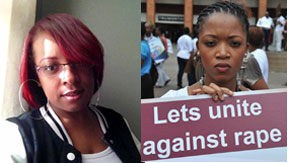
 Rape and the myth of ‘the strong Black woman’
Rape and the myth of ‘the strong Black woman’
Bill Cosby controversy forced Sharita J. Lee to revisit her rape 20 years ago. (Photo courtesy of Sharita J. Lee)
Rape protester.
By Jazelle Hunt, NNPA Washington Correspondent
(First in a Series)
A woman gets raped every two minutes in the United States. According to the U.S. Justice Department, nearly one of every five Black women – 19 percent – are raped each year. Many experts suspect those figures severely understate the problem. For example, research by the Black Women’s Blue-print, Inc., a New York City-based civil and human rights organization of women and men, reports that 60 percent of Black women have been sexually assaulted by the time they are 18 years old.
Whatever the actual number, too often, the victims – including a surprising number of males and young girls – suffer alone. Efforts to discuss the abuse are usually met with disbelief or a feeling that such behavior should be quietly swept under the rug, as though ignoring the problem will magically make it disappear.
As a matter of policy, news organizations generally with-hold the names of rape victims. But Black women in particular are beginning to break this silence, bravely coming out of the shadows to publicly reveal their names and faces and share their painful stories in hopes of exposing and ending this all-too-common violence. This series by NNPA Washington Correspondent Jazelle Hunt ex-amines rape in the Black com-munity and the long path to-ward healing.
WASHINGTON, D.C. (NNPA) – For 20 years, Sharita J. Lee was numb. She did not cry. She did not love the men she dated. The only emotion she could muster was rage.
But that changed recently when she caught wind of the storm of sexual assault allegations involving Bill Cosby, America’s favorite TV dad. One by one, more than 30 women lodged charges against the comedian, some dating back 45 years. And one by one, their revelations were met with skepticism, personal attacks on the accusers, and even outright scorn.
“Until then, I had thought about [my assault], but I didn’t have any emotion about it,” Lee recalled. “I wouldn’t have felt anything until I read that article,” Lee said.
After reading the article about comedian Hannibal Buress’ jab at Bill Cosby, Lee scrolled to the comments section. She couldn’t believe how many people questioned why these women were coming forward decades later. Appalled, she opened her laptop, and penned all the gory details of her rape and its aftermath for the world to see. Her account was published on a blog just before Christmas.
The topic of rape has not only been revived by the controversy surrounding Bill Cosby but also by misbehavior in other segments of society. For example, dozens of high-ranking military officers have been fired for rape or having inappropriate sexual affairs with women with-in and outside their command.
Rape on college campuses has received wider coverage following a series of high-profile campus rapes, including one at the United States Military Academy at West Point. The Department of Education announced last May that it is investigating 55 colleges for mishandling complaints of sexual violence, a figure that has since risen to 90.
Last week, two Vanderbilt University football players were found guilty of raping an unconscious fellow co-ed and two more former football players are awaiting trial and Florida State quarterback Jameis Winston, a former Heisman Trophy winner, has been dogged for more than a year amid allegations that he raped a FSU student in December 2012; an attorney for the student announced plans to sue the university.
Most Americans do not know as much about rape as they think.
According to the Department of Justice:
Somewhere in America, a woman is raped every two minutes;
22 percent of victims were younger than age 12 when they were first raped, and 32 percent were between the ages of 12 and 17;
Twenty-five percent of girls and 17 percent of boys are sexually abused before the age of 18;
Seventy percent of rape and sexual assault victims know their attacker prior to the assault and
Of college women questioned, about 90 percent of rape and sexual assault victims knew their attacker prior to the assault.
It took Sharita Lee close to two decades to truly break her silence.
Two decades ago, she was a 20-year-old New Orleans native serving her country as a member of the U.S. Navy. She had joined the military to distance herself from home, where her stepfather physically abused her mother, who was battling alcoholism.
But she returned to New Orleans immediately when she learned her grandfather was on his deathbed. During her visit, she ran into a childhood friend at her uncle’s house, and the two caught up. A few hours passed as they laughed and reminisced on the couch. Then, Lee got the call that her grand-father had died.
Abruptly, in the middle of condolences and small talk, he lunged at her. In a fluid flurry, he grabbed her legs and pulled her toward him. He pinned her knees to her chest. She shoved him. Unmoved, he yanked the back of her pants up to her thighs. He was a foot taller and outweighed her by 100 pounds. She was stunned.
Next week: Rape’s other victims




Be the first to comment